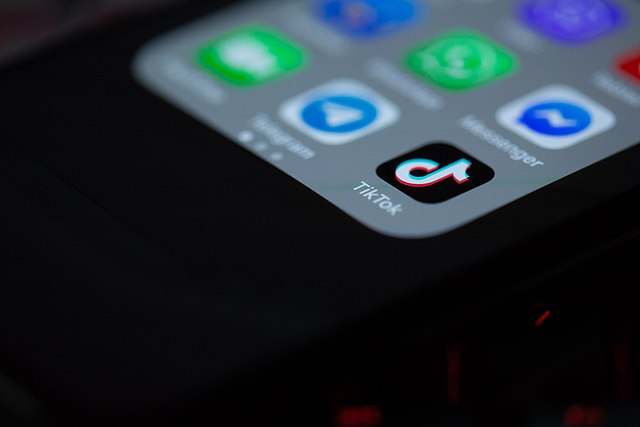TikTok threatens our national security
The social media app should be banned in the United States
TikTok’s data collection poses a threat to U.S. security, writes Oliver Hale.
March 28, 2023
Like many people I know, I use TikTok almost two hours every single day. The addictive app serves short videos to more than 1 billion users worldwide, but it’s easy to get caught up in the glamor and forget the implications that TikTok has on our everyday lives. TikTok’s access to American data and its influence on American public opinion are two main reasons why the app should be banned for our national security.
First, and most obvious, the app presents data security concerns. The Chinese government has extraordinary access to its companies’ data. China’s National Intelligence Law allows the Chinese government to have uninhibited access to the data of any company, even companies that operate in foreign countries. Since almost 150 million Americans are TikTok users, this makes their data vulnerable to surveillance by the Chinese government, as TikTok is owned by the Chinese company ByteDance.
This is a problem because China is a geopolitical and ideological rival of the U.S., and the two countries are in the stages of a new Cold War as China has been building its military to rival the U.S. military for decades now. Their saber-rattling over Taiwan and the South China Sea has been met by American military expansion in the area. China is also economically competing with the U.S. in new fields such as artificial intelligence and quantum computing. We have also been in a trade war with China since 2018.
But China is more than a geopolitical rival. There are stark ideological differences at stake, too. The contest is a struggle between authoritarianism and democracy — or autonomy and freedom.
We wouldn’t have allowed the Soviet Union to have such invasive and unprecedented access to the data of hundreds of millions of American citizens, so why do we allow the Chinese government to do so? What’s worse is even an instant withdrawal of access will not change the fact that China already knows so much.
“We can’t ban them from the data they already have,” former NSA general counsel, Glenn Gerstell, told Forbes. Still, a ban would help secure the safety of newly-created data.
Access to Americans’ data is not even the most important concern. The second problem, which is perhaps the most concerning, is how China could influence the American public’s opinion. Although it is already happening, the worst is yet to come.
China, through state media networks, is already promoting pro-Chinese views on TikTok. Through a network of “influencers,” who hide their ties to Chinese state media, the Chinese government is pushing propaganda. This propaganda ranges from seemingly innocuous videos celebrating China’s natural beauty, to videos parroting Chinese Communist Party propaganda about the Ukraine war or human rights abuses in Xinjiang.
Like I said, the potential worst-case scenario is yet to come. In a crisis — like an invasion of Taiwan — China would have unprecedented control over American public opinion and could push propaganda and misinformation to nearly half of America.
Something like this would have been unconscionable in the Cold War.
This crisis, as of now, is hypothetical, but the sway that China has over American public opinion is not. A current TikTok employee detailed this control in a Forbes article on March 21.
“If you want to start a movement, if you want to divide people, if you want to do any kind of operation to influence the public on the app, you can just use that information to target those groups,” he said. It is clear that the power TikTok gives poses a national security risk to America.
But the ban would not come without precedent. In 2019, the U.S. banned Huawei, a Chinese tech company that was set to become the largest smartphone manufacturer in the world, for similar national security reasons.
China has banned nearly every American social media platform and censors movies, television, literature and news. TikTok itself is banned in China — only Douyin, the heavily censored Chinese counterpart, is allowed.
The ban of one app in America would be moderate in comparison.
One objection to the ban is that it would be a restriction on free speech, but a TikTok ban would simply restrict the platform, not the content. There are many non-Chinese competitors to TikTok, like YouTube, Instagram, Snapchat and more that would still be free to operate and oversee that same content.
Congress is looking to address this problem. The CEO of TikTok Shou Chew testified before Congress on March 23 about data access and national security concerns and faced bipartisan scrutiny. And the Speaker of the House of Representatives says legislation is moving forward.
Although I believe this needs urgent action, the ban would face numerous legal challenges.
Even if these challenges could be overcome, it is unclear if President Joe Biden would enact the ban. Biden politically relies on the younger generation for support — the app’s largest demographic. Biden’s commerce secretary acknowledged the political liability saying that Biden’s team could “lose every voter under 35, forever.”
Still, the process of banning the app should start now.
Update March 30, 2023: This article has been updated to correct a typographical error.












